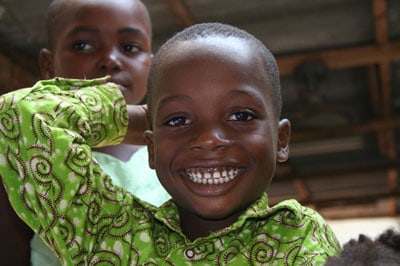The Prayers of a Sponsored Child
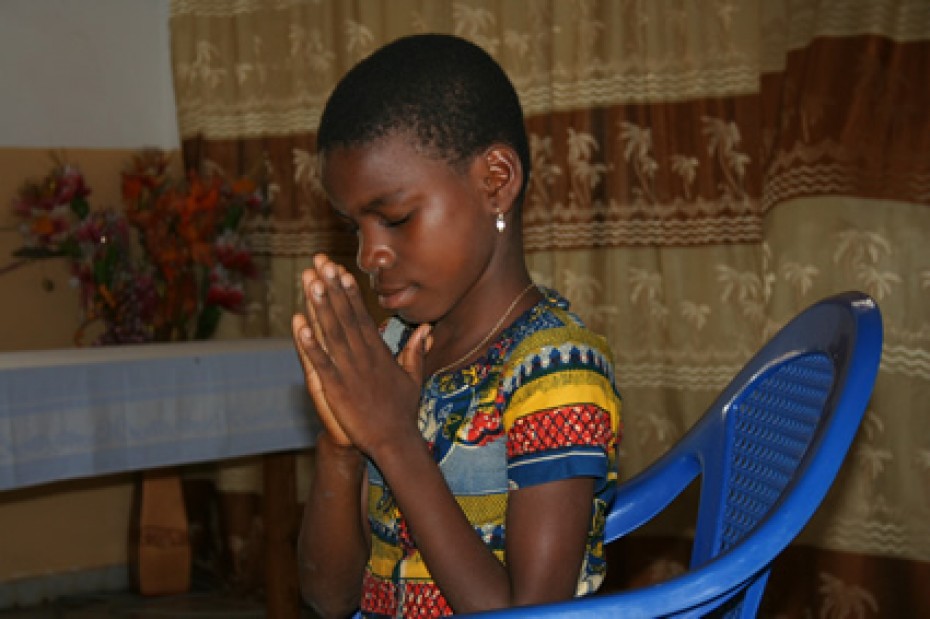
Sponsored children pray and ask God for direction, for someone to love them, for provision — for more of Him. How different (or similar) are your prayers?
Continue Reading ›What is the Most Interesting Thing Your Sponsor Has Told You?
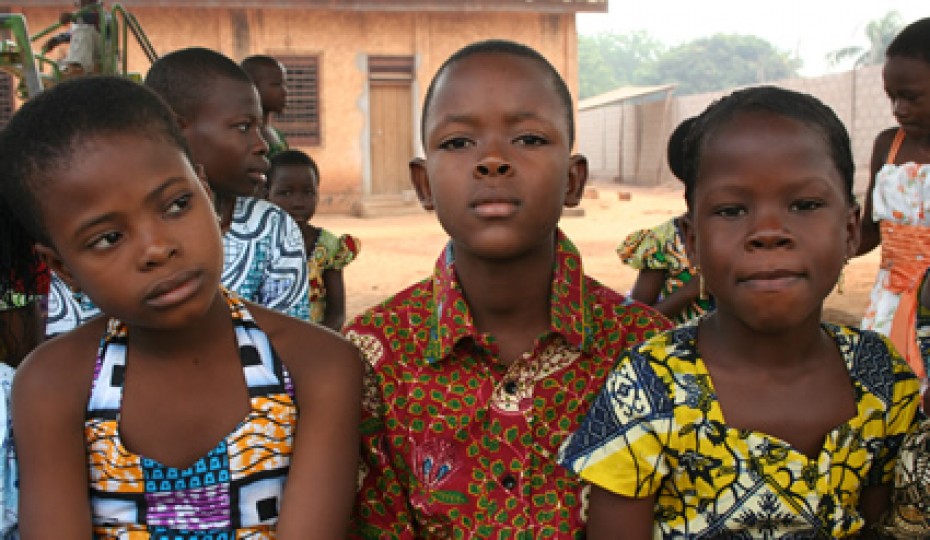
The things you share in your letters may sometimes feel like every day news to you but your words encourage, motivate and provide tangible evidence to a child living in poverty that they are loved.
Continue Reading ›
Ministry Highlight: Togo
We began our ministry in Togo in 2009 with the Child Sponsorship Program. In just under two years we have registered more than 4,300 children and we partner with 20 Implementing Church Partners.
From One Child to 1 Million Children
One Child, Each Child, Every Child Is Special
As you know, we recently announced our millionth sponsored child. Now, I won’t tell you a lot of random facts about 1 million.
Like how long it would take you to count to 1 million (14 days).
Or how much 1 million dollar bills weigh (2,204 pounds).
Because as important as 1 million is, and as huge of a milestone as 1 million sponsored children is, it’s really just about one child.
And a few weeks ago, I got to meet that one child — Fellow Blewussi Kpodo. He lives in a dusty community just outside of Lomé, Togo.
Fellow’s whole family had come out for our meeting. His father stood proudly, his arm on the shoulder of his oldest son. Fellow’s two older sisters darted in and out of the house, covering their faces and giggling at the sight of my pale skin. His younger brother made himself at home in my lap.
All the while, Fellow watched the commotion with his solemn brown eyes.
I stared at his eyes when he wasn’t looking. Fringed with dark eyelashes, I wondered at what they had seen.
They had watched his father battered by grief when Fellow’s mother died five years ago.
They had filled with tears when the headmaster sent him home from school because he didn’t have his school fees — again.
They had stung with smoke as he bent over the small fire he prepared every evening for his sisters to cook cassava and dried fish for dinner.
And now, those same eyes sought out mine.
“He has a question for you,” explained the interpreter. I nodded. “He wants to know if you know his sponsor.”
I grinned at Fellow, and for the first time a smile reached his eyes.
“I don’t know her,” I explained. “But I know that you are very special to her.”
And in that moment, everything else faded away. Fellow wasn’t one of a million children. He was just one.
One child.
One sponsor.
One more step toward changing the world.
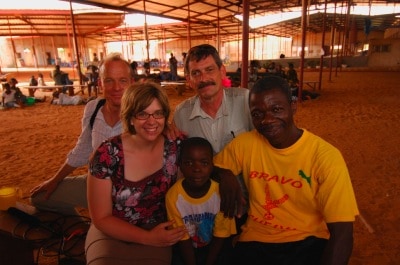
“The child must know that he is a miracle, that since the beginning of the world there hasn’t been, and until the end of the world there will not be, another child like him.” – Pablo Casals
Our 1 Millionth Child
It is my great privilege to introduce you to Fellow Blewussi Kpodo, our 1 millionth sponsored child! Fellow is 8 years old and lives in Togo with his father, two older sisters and one younger brother. And he now has a very bright future! 🙂
And who better to stand alongside this precious little one than the world’s strongest woman? Fellow’s sponsor is Jang Mi-Ran, a long-time Compassion supporter and Olympic gold medalist weight lifter from Korea.
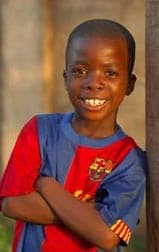

So, the strongest woman in the world is now sponsoring one of the most vulnerable children in the world!
One Million Children Sponsored
I am overwhelmed with gratitude as I write this. Today, as we do every day, we have the privilege of acting as a bridge between caring sponsors and children in need.
However, this particular day we have a sponsorship that is very special in that it represents a milestone for our ministry. Compassion is currently serving 1 million sponsored children! One million!!
I wish we could all be together today to celebrate this joyous moment. What a day it is!
Thank you sponsors! Thank you for your love of children. Thank you for your faithfulness to God’s call on your lives.
I love you, and I love serving the Lord with you through this amazing ministry!
Updated at 4:30 p.m. MDT
“Look at the nations and watch – and be utterly amazed. For I am going to do something in your days that you would not believe, even if you were told.” – Habakkuk 1:5 (NIV)
Tune into Fox and Friends tomorrow (May 21) at 6:50 a.m. EDT to “meet” our 1 millionth child and his sponsor.
The newly sponsored child lives with his father outside Togo’s capital city of Lomé. Togo, a country whose population is seriously affected by the devastation of AIDS, is the most recent country to join the growing list of nations where Compassion works.
The child’s sponsor is from South Korea, the country in which Compassion began its mission 57 years earlier. The sponsor is most recently noted for a gold medal she won at last year’s Beijing Olympics.
She Is Hungry
She didn’t eat yesterday.
The little girl told me that as we sat with her and her mother under a mango tree. The fruit was not ripe yet, and still sat high and green and out of her reach.
Just behind the house, a few rows of corn grew. But they didn’t belong to her family. She could see them every day. But they were out of her reach.
I feel like every week I write about children who “went to bed hungry.” And they did. But right then, I sat before a little girl who literally went to bed less than 24 hours ago with nothing to eat.
I tried to imagine the tiny bit of hunger I’ve felt in my life, magnified. That small ache after missing a meal turned into deep pain after missing one, two, three meals. The slight ache when I take my lunch late turned into a pounding, relentless headache when late turns into never.
I couldn’t imagine it. But this little girl doesn’t have to imagine it. She lives it.
She is hungry when she walks past the market, her pockets empty.
She is hungry when her neighbors light up their braziers at night while her family’s remains cold.
She is hungry while fresh fruits and vegetables are in her sight, but not on her table.
As we left that night, we hauled a bag of rice out of the back of our van. Her mother bowed her head, thanking us over and over. And I knew that when this little girl visited the child development center, she would receive a meal. And that the center workers would watch her carefully, and at the first sign of malnutrition, she would be treated.
Those things are not out of her reach.
Merci
She walked slowly out of her classroom, her face turned towards the ground. Her shoulders hunched up around her ears, the ragged sleeves of her dress nearly reaching her elbows.
“What’s wrong with her?” I asked the group around me. They stopped the girl, and French phrases passed much too quickly for me to keep up. Finally, someone translated for me.
“She can’t pay her school fees, so they’re sending her home.”
That’s when I noticed the headmaster, moving from class to class, a list in his hands. Those were the children who hadn’t paid their fees. He was calling them to the front of their class and asking for the school’s money. And if they didn’t have it, they were sent home.
Read the rest of the entry at I’m Just Sayin’
Afi’s Angle
I’m currently on a story-gathering trip in Lome, Togo, our newest country, which is where I met Afi.
Afi stood shyly inside her home as we hauled in our gear — cameras, video equipment, tripods and microphones. Her dusty yard was shaded by heavy papaya trees, offering a bit of relief from the hot sun that had beat down on us for the past few hours.
I sat on a small wooden stool, worn smooth.
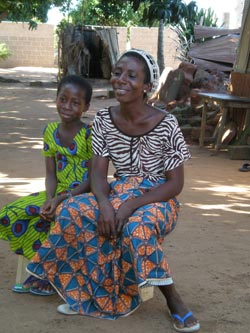 Afi’s brothers crowded onto a splintered bench that leaned against a tree trunk. Afi and her mother sat close together, a microphone just a few inches from their heads.
Afi’s brothers crowded onto a splintered bench that leaned against a tree trunk. Afi and her mother sat close together, a microphone just a few inches from their heads.
The interview went smoothly. But my mind is one of a journalist. So I sat there, gnawing on my pen cap, wondering what my “angle” would be.
My thoughts were interrupted when one of the child development center workers leaned close and began whispering to me.
She told me that 8-year-old Afi had been to school for only three months in her entire life. Yet, just a few weeks ago she had tested eighth out of the 50 children in her class.
This quiet little girl in front of me, the one who swept the dirt yard of her family’s compound at this very moment, was brilliant. And it hit me.
Afi wasn’t a rebellious child who had been reformed by Compassion. She was relatively healthy. Her parents loved her and had never abused her.
But if not for the support of Compassion, Afi would have slipped through the cracks. She would have spent entire days on the futile task of sweeping that very dirt yard.
I don’t know if she would have found some other way to further her education. I don’t know if God would have provided some other way for her to overcome.
But I don’t have to wonder about those things. Afi is in school now. She is learning and growing every day.
I know that she has opportunities that didn’t exist for her a year ago. And I know that she has not slipped through the cracks.
I believe Afi’s world has been changed.
But I also believe that Afi will change the world.
That is Afi’s angle.
199
“How many children are at the project we’re going to?” I asked the Compassion worker as we finished up lunch.
“One hundred ninety-nine,” she answered. What an odd number. She must have noticed my confused look.
“They lost a child last month.”
I wished with everything that “lost a child” literally meant lost a child. As in just misplaced for a few days. She would be back soon. But I knew that wasn’t the case.
“What happened to her?” someone else at the table asked. I couldn’t bring myself to say it. I couldn’t acknowledge what “lost” really meant.
Read the rest of the entry at I’m Just Sayin’
Compassion Togo Registers Its First Child
Story by Delanyo Tenge, Compassion Togo program communications manager, and Barb Liggett, Global Strategy Office intern
September 17, 2008 was the day the staff of Compassion Togo (CIT) had prepared fervently for, and the excitement had reached its peak. As Compassion’s newest country, the staff began registering children in Compassion Togo’s first child development center.
At MESA (Ministères Evangeliques pour le Salut des Armes), the partner church for Togo’s first Compassion children, Pastor Happy and his entire congregation are enthusiastically helping CIT become deeply rooted in Togo.
“We want to equip the local churches so they can minister to their community holistically and win them to Christ. We want to help the church turn their community into a place of hope for the future,” says CIT Country Director Mawuna Lawson.
The first child registered in Togo was David. The second was his sister, Gracia. When asked what he hopes to be when he grows up, the quiet David whispers “a carpenter.”
Even though it was the first registration, errors and omissions were few. CIT has set a goal to register more than 2,000 children the first year. There are currently 10 partner churches and six staff members in the county. Compassion Togo faces a steep road, but the hard work already done and the passion displayed in the ministry make it clear that much should be expected from the new Compassion country.
Another pastor shares his joy,
“We have been asking God how better we can help our children grow up and become good Christians and responsible adults, occupying good positions in our country; it has always been a burden on our heart. So when CIT came, we knew they were God sent, we didn’t need to ask how, when or why they came, all we needed to do was to thank God and to embrace the task he had laid ahead for us to do together with CIT.”
Compassion Togo: Putting Faces to the Statistics
This is part four in our four part series – The Case for Compassion Togo
Driving through the streets of Lome, Togo, scenes unfold that are far too common in sub-Saharan Africa. Individuals ranging from very young to very old sit and stand at the side of the road, hoping to sell baked goods or sweets or small kitchen items or a myriad of other trinkets to passers-by. The roads are bad and get worse as you depart the busiest streets. Many of the buildings — showing signs that they were beautiful at one time — appear to have been abandoned long ago but are, in fact, current offices and businesses.
In a place where even those with “stable” civil jobs have no guarantee of being paid, the overarching atmosphere is one of apathy brought on by too many years of being resigned to the situation. But in the midst of all this, there are people who refuse to accept the current circumstances, who reject the idea that there is nothing to be done.
Take, for example, Pastor Happy and his Pentecostal congregation located in the heart of Lome. Pastor Happy possesses a smile and exudes an optimism that confirm in every way the appropriateness of his name. Though the congregation is large, it is also poor and so the sanctuary is a work-in-progress, complete with rustic wooden scaffolding and tarps over areas that don’t yet have the protection of a roof.
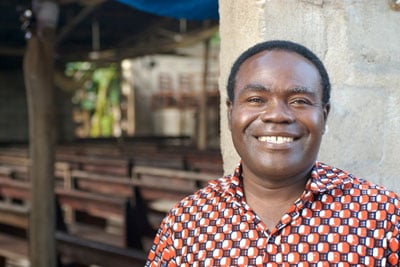
Pastor Happy explains that his church recognized a few years ago that they must “have a vision for helping those in need — and addressing more than just their spiritual needs.” What the congregation lacks in financial resources it has made up for in passion, creativity and dedication. When they outgrew the one room they had available for children’s Sunday school, rather than waiting to come up with funds or space for another building project, Pastor Happy simply went to the school located next door and asked if they could use the classrooms on the weekend. The school agreed.
In addition to the Bible classes, the church now houses a medical clinic, provides food, clothing, school supplies and more to those with the greatest need in their community and shows films with a positive message after school so children have a safe place to go. All this is accomplished largely through the donation of goods, time and services of church members with a vision. The church would like to be able to do more, but in the meantime has decided to be faithful with the opportunities that present themselves.
Among those who have been positively impacted by the church’s ministry is the family of a couple called Mesa and Ama. Even before one has an opportunity to speak with their six inspiring children, this couple is exceptional. In a country where pastor after pastor estimates that 80 to 90 percent of the families in their communities are headed by single mothers, that Mesa has stayed faithful to his wife and family is a notable fact.
Mesa is a carpenter and Ama sells secondhand clothing. Their two daughters and four sons join in, but the family has also made sure that all the children stay in school.
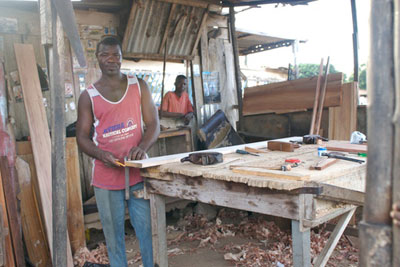
Awolfa, 19, is the right arm of her mother in caring for the rest of the family but also has been able to complete secondary school and is currently attending classes to become a tailor. Her 16-year-old brother Francis and 12-year-old brother Felix both dream of being doctors, and 15-year-old Edem hopes to become a pastor.
Though they struggle to meet all their current needs, this family has not lost the belief that the future can be different. It is tempting to consider how far such a motivated group might go with the added support of Compassion’s child development program, and it is in the faces of the two youngest, seven-year-old David and his four-year-old sister, Gracia, that one sees the possibility of this future.
David is quiet and contemplative and Gracia is his exact opposite. When asked what he hopes to be when he grows up, he whispers “a carpenter.” Gracia does not wait to be asked, but announces loudly, “I will be a seamstress like Awolfa.”
By starting a work in Togo, Compassion has the opportunity to minister to the Davids as well as the Gracias, along with the tens of thousands of children whose lives are even more unstable and uncertain because they have only one parent or have no one to advocate for them regarding the importance of staying in school. It’s an opportunity to support and encourage those parents like Mesa and Ama, who by some miracle have not lost their hope and vision for the future — and to bring back hope to those who have begun to despair.
Story and photos by Phoebe Rogers
The State of the Church
This is part three in our four part series – The Case for Compassion Togo
Christianity in Togo dates back to the mid-1800s when the Methodist and Presbyterian denominations organized churches in the country. They were followed by the Catholic Church about 40 years later and today are joined by churches affiliated with the Assemblies of God, Pentecostals, Baptists, Lutherans and many other denominations. According to available statistics, Togo is 29 percent Christian.
In recent decades, several “umbrella” organizations have formed that include church leaders from the various denominations who desire to work together. In the past, there has been little-to-no collaboration among the denominations, but leaders are rising up who wish to bring unity and strength to the Church so that they might in turn more effectively evangelize and influence their country.
Many of these church leaders share anecdotal evidence that the church is currently growing at a more rapid rate than in past times. Many have also identified their ministry to children as a universally weak area among the churches, and at the same time, recognize a need for a greater focus and strength of purpose if they are to influence these young people who are future of their country.
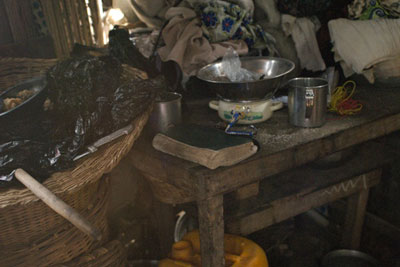
Increasingly, churches in poor areas (which are by far the majority of churches in the country) are recognizing that if they are to be relevant within their communities, they must address more than only the spiritual state of the people. Some churches simply take up offerings and use the funds to try to meet the various needs that come to their attention. Others are more structured, asking people to bring extra clothing, shoes, food and school supplies they might have so that they can be redistributed to those with the most severe need.
A church in Lome shows films with a positive message after school to give children a place to go so they won’t loiter in the streets. Thanks to the vision of a retired doctor, this same church also runs a clinic where they not only treat those who need medical attention in their own community but also train volunteers so that they can go out and minister through medicine in nearby rural communities.
Everywhere there are children, so many children, most coming from single-parent homes and many of whom have little adult influence on their lives. Many churches desire to find ways to improve and expand their children’s ministries, want to attempt to provide more structure and even have begun looking for ways to train those who work with the children so they might provide better guidance.
There is anecdotal evidence that these ministries are positively impacting these churches’ ability to witness to and impact their communities. This may be seen both in the way the church leaders are received and welcomed when they visit homes in the communities, and also in the comfort level that neighbors — and especially the children — feel to come to the church.
TOMORROW: Putting Faces to the Statistics
Story and photo by Phoebe Rogers

